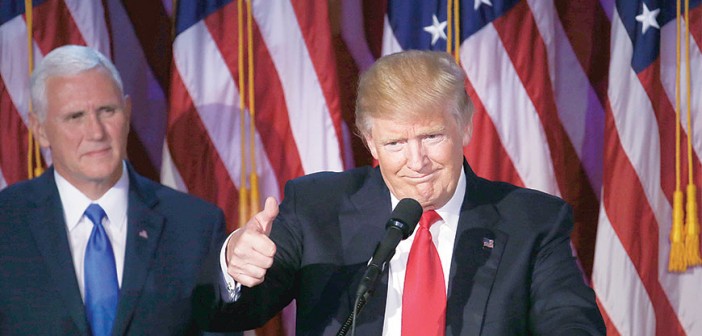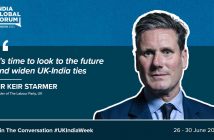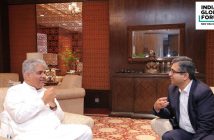If candidate donald Trump set the cat among the pigeons in India’s policy circles, President-elect Trump still hasn’t allayed all the anxieties he stirred during his election campaign. The question many analysts are asking is: How will Trump’s presidency impact India?
There are no clear answers yet, despite his avowed love for “Hindus and Indians”, and his campaign ad that said: “The Indian and Hindu community will have a true friend in the White House.”
That’s because his shrill rhetoric against outsourcing — the bread and butter of India’s $146-billion IT industry — and his threat to fight immigration have set alarm bells ringing in New Delhi, Bangalore and Mumbai.
But wait…. Trump is a businessman and so, one would hope he knows that sensible outsourcing actually increases the efficiency of US companies and enables them to take on competitors from elsewhere with better, cheaper and more dependable products and services.
And his oft-forgotten statements on how smart Indians who top their classes in Harvard should be encouraged to stay back in the US and create jobs there suggest that just as he seems to be rethinking his negation of Obamacare, he could, perhaps, reconsider his shrill poll rhetoric on immigration and outsourcing — or tone it down considerably — when confronted with the actual weight of holding the most powerful position in the world.
India will have to move quickly to hammer home the point that Indian companies, including its much-maligned IT companies, are actually net job creators in the US and not the job destroyers that protectionists in that country paint them to be.
Vishal Sikka, CEO of Infosys, arguably the best-known Indian IT company in the world, for example, is not based in Bangalore. He and many in his executive team sit in Silicon Valley. And even as Indian companies have gone global, they have increasingly hired and trained local talent, notwithstanding slanted media stories in the US about H1B visa holders stealing jobs from qualified Americans.
The Modi government should also proactively reach out to Trump and members of his senior team to drive home the message that India’s global aspirations are aligned to US long-term interests.
Narendra Modi’s motto is India First; like-wise Trump believes in US First. The two positions are not as conflicting as may appear. India can play a key role in actualising Trump’s goal of building closer ties with Russia, a la the part played by Pakistan, at the height of the Cold War, and as an engaging pivot in the now floundering relationship between the US and China. India can, if it has the appetite, also play the role of the honest broker in normalising Washington’s strained ties with Tehran.
So, there could after all be alignment of vision between New Delhi and the incoming government in Washington. Such a development could reduce tensions in the Middle East and at the same time check China’s increasingly aggressive wooing of Vladimir Putin and its expansionism in Asia.
At the same time, India will be hoping that President Trump does not try to rewrite the US-Japan-India partnership that has emerged under President Obama or his Pivot to the East, which is crucial for maintaining peace in Asia. Therefore, the fact that Modi’s good friend Shinzo Abe was the first world leader to meet Trump, and appear to have got on well, is a good omen for the realignments in world diplomacy that are emerging.
As for Pakistan, Atal Bihari Vajpayee famously said that India and Pakistan should put their contentious issues into ‘cold storage’. It’s possible that the Trump administration will be sufficiently minded to actually put Pakistan itself in cold storage, rather than the traditional but nonsensical balancing act that Hilary Clinton would have no doubt played. New Delhi, I am sure, would welcome this as it is the new reality it has been calling for from the West.
There have been reports that have quoted some of Trump’s influential Indian-American backers saying that he will, as President, approve a pending Bill to designate Pakistan as a state that sponsors terror. This will be a dream come true for some Indians but it will not serve India’s purpose. A Pakistan that is beyond the pale is a country that is doubly dangerous. And after all, India itself must reassess Pakistan’s absurd Most Favoured Nation status that it has unilaterally bestowed upon its neighbour. No doubt such gesture politics in the first few months of a Trump administration will be interesting to witness. But I am not sure how far they will take us towards lasting peace and prosperity that has to be the ultimate cornerstone of India’s own global ambitions.
And finally, India will be hoping to get a fair (not necessarily ‘free’) trade deal from the US even as Trump threatens to walk out of the US’s existing commitments to various multilateral trade pacts. Mutually beneficial trade deals can generate prosperity not only in the US and India but also spread the good cheer in other countries.
Are these too much to hope for? Not really. Trump may be a maverick, and I am certainly no fan. But I very much hope he turns out to be a hardnosed realist who knows a good thing when he sees it. And as many people now acknowledge, the world’s oldest democracy is a natural ally of the world’s largest.
I’m hoping that Trump’s entrepreneurial instincts, coupled with the fabled checks and balances of Capitol Hill will trump the politics of victimhood that propelled him to the most powerful office in the world. New Delhi and Washington have found each other on opposite sides of the fence for far too long in the past. But after many false starts, these two “natural allies” have begun to walk down the same path and speak the same language. The India-US rule book doesn’t need to be re-written, and it must not be. Rather it should be built on. Especially given the strides in the recent Modi era. But a bit of re-calibration on both sides won’t go amiss.
Source: Business World India







